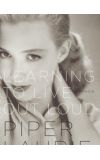
08 Nov 2011 10:24:48
"Learning to Live Out Loud" is Laurie's absorbing memoir about that personal transition as well as her professional development from a popular star of grade B entertainments to an Oscar-nominated actress ("The Hustler," ''Carrie" and "Children of a Lesser God") who also had memorable roles on television and the stage.
She was born in 1932 to first-generation American Jews — her mother's parents had emigrated from Russia, her father's from Poland. They accepted their youngest daughter's relative silence — she now believes she suffered from acute anxiety disorder — without much question.
Laurie would find her voice through the make-believe world of acting. But she wanted to say something meaningful, too. Her career as a Universal contract player in movies like 1951's "The Prince Who Was a Thief" turned out to be profitable but hardly challenging.
Rebelling against her image as a "perky starlet," she tore up her contract in spite of an uncertain future. TV dramas of the 1950s sharpened her talents, yet acclaimed turns in the live TV play "The Days of Wine and Roses" in 1958 and the 1961 movie "The Hustler" with Paul Newman didn't result in more top roles.
Laurie left movies for 15 years. Living in upstate New York, she grew personally as a wife, a mother and an artist. Her return to the screen as Sissy Spacek's mother in 1976's "Carrie" heralded a new phase in her career that would include the cult TV series "Twin Peaks" (1990-1991).
Gregory Peck, her co-star in "Other People's Money" in 1991, described one of Laurie's performances as "a series of revelations moving and true." That could be said of "Learning to Live Out Loud." In a voice that is simple and straightforward, she looks back in joy and amusement, in anger and disappointment, and with tinges of regret.
Laurie achieves what eludes many performers when they write about their outsize lives: a gripping but intimate story that never loses touch with the complexities of life that challenge all of us.

